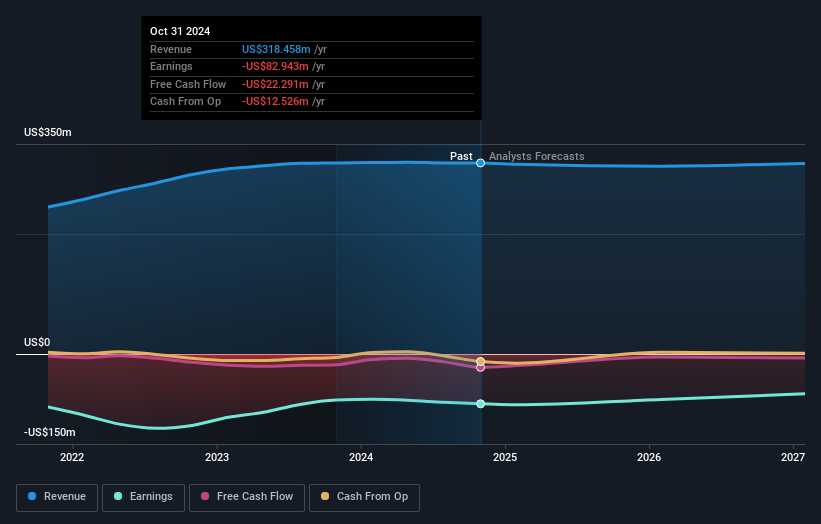- United States
- /
- Software
- /
- NasdaqGM:DOMO
Positive week for Domo, Inc. (NASDAQ:DOMO) institutional investors who lost 24% over the past year

Key Insights
- Significantly high institutional ownership implies Domo's stock price is sensitive to their trading actions
- The top 7 shareholders own 51% of the company
- Insiders own 16% of Domo
To get a sense of who is truly in control of Domo, Inc. (NASDAQ:DOMO), it is important to understand the ownership structure of the business. The group holding the most number of shares in the company, around 66% to be precise, is institutions. Put another way, the group faces the maximum upside potential (or downside risk).
Institutional investors would appreciate the 13% increase in share price last week, given their one-year losses have totalled a disappointing 24%.
Let's take a closer look to see what the different types of shareholders can tell us about Domo.
See our latest analysis for Domo

What Does The Institutional Ownership Tell Us About Domo?
Many institutions measure their performance against an index that approximates the local market. So they usually pay more attention to companies that are included in major indices.
As you can see, institutional investors have a fair amount of stake in Domo. This can indicate that the company has a certain degree of credibility in the investment community. However, it is best to be wary of relying on the supposed validation that comes with institutional investors. They too, get it wrong sometimes. It is not uncommon to see a big share price drop if two large institutional investors try to sell out of a stock at the same time. So it is worth checking the past earnings trajectory of Domo, (below). Of course, keep in mind that there are other factors to consider, too.

Institutional investors own over 50% of the company, so together than can probably strongly influence board decisions. Domo is not owned by hedge funds. The company's largest shareholder is The Vanguard Group, Inc., with ownership of 13%. With 12% and 8.6% of the shares outstanding respectively, Joshua James and BlackRock, Inc. are the second and third largest shareholders. Joshua James, who is the second-largest shareholder, also happens to hold the title of Chief Executive Officer.
On further inspection, we found that more than half the company's shares are owned by the top 7 shareholders, suggesting that the interests of the larger shareholders are balanced out to an extent by the smaller ones.
While studying institutional ownership for a company can add value to your research, it is also a good practice to research analyst recommendations to get a deeper understand of a stock's expected performance. Quite a few analysts cover the stock, so you could look into forecast growth quite easily.
Insider Ownership Of Domo
The definition of an insider can differ slightly between different countries, but members of the board of directors always count. Management ultimately answers to the board. However, it is not uncommon for managers to be executive board members, especially if they are a founder or the CEO.
Insider ownership is positive when it signals leadership are thinking like the true owners of the company. However, high insider ownership can also give immense power to a small group within the company. This can be negative in some circumstances.
Our most recent data indicates that insiders own a reasonable proportion of Domo, Inc.. Insiders own US$45m worth of shares in the US$284m company. It is great to see insiders so invested in the business. It might be worth checking if those insiders have been buying recently.
General Public Ownership
The general public-- including retail investors -- own 19% stake in the company, and hence can't easily be ignored. While this size of ownership may not be enough to sway a policy decision in their favour, they can still make a collective impact on company policies.
Next Steps:
It's always worth thinking about the different groups who own shares in a company. But to understand Domo better, we need to consider many other factors. Case in point: We've spotted 2 warning signs for Domo you should be aware of, and 1 of them is a bit concerning.
But ultimately it is the future, not the past, that will determine how well the owners of this business will do. Therefore we think it advisable to take a look at this free report showing whether analysts are predicting a brighter future.
NB: Figures in this article are calculated using data from the last twelve months, which refer to the 12-month period ending on the last date of the month the financial statement is dated. This may not be consistent with full year annual report figures.
New: Manage All Your Stock Portfolios in One Place
We've created the ultimate portfolio companion for stock investors, and it's free.
• Connect an unlimited number of Portfolios and see your total in one currency
• Be alerted to new Warning Signs or Risks via email or mobile
• Track the Fair Value of your stocks
Have feedback on this article? Concerned about the content? Get in touch with us directly. Alternatively, email editorial-team (at) simplywallst.com.
This article by Simply Wall St is general in nature. We provide commentary based on historical data and analyst forecasts only using an unbiased methodology and our articles are not intended to be financial advice. It does not constitute a recommendation to buy or sell any stock, and does not take account of your objectives, or your financial situation. We aim to bring you long-term focused analysis driven by fundamental data. Note that our analysis may not factor in the latest price-sensitive company announcements or qualitative material. Simply Wall St has no position in any stocks mentioned.
About NasdaqGM:DOMO
Domo
Operates a cloud-based modern AI and data products platform in North America, Western Europe, Australia, Japan, and India.
Fair value very low.
Similar Companies
Market Insights
Community Narratives



